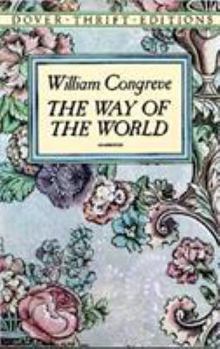The Way of the World
Select Format
Select Condition 
Book Overview
If seventeenth- and eighteenth-century comedy differ in that the former is about sex (and adultery actually happens) while the latter is about love (and adultery is merely threatened), then Congreve -... This description may be from another edition of this product.
Format:Paperback
Language:English
ISBN:0486277879
ISBN13:9780486277875
Release Date:January 1994
Publisher:Dover Publications
Length:96 Pages
Weight:0.20 lbs.
Dimensions:0.3" x 5.2" x 8.3"
Age Range:14 years and up
Grade Range:Grade 9 and higher
Customer Reviews
3 ratings
Classic Comedy of Manners - Restoration Period
Published by Thriftbooks.com User , 19 years ago
The first three acts of William Congreve's play, The Way of the World (1700), involve little action. The scenes focus on introducing and contrasting characters, highlighting witty dialogue, and slowly revealing details of prior events through casual references. Polite, formalized language disguises selfish motives, rivalries, deceit, and deviousness. Selfish motives, deciet, and other negative attributes may not seem a proper basis for comedy, and yet The Way of the World warrants four stars. For comparison purposes I strongly recommend reading two other Restoration period comedies: Wycherley's The Country Wife (1675) and Etherege's The Man of Mode (1676). All three plays share a cynical view of the sanctity of marriage and portray a self-centered London society obsessed with extramarital affairs. The action (certain steps to overcome obstacles to a marriage) in The Way of the World does not occur until the later acts. The marriage between Mirabell and Millamant proceeds only after both are assured that their financial situation will not be jeopardized. Love is secondary. Similarly, the unpleasant situation of Mrs. Fainall - a marriage without any pretence of love - remains unchanged. While humor may be somewhat sparse in the earlier acts, the tempo clearly picks up in acts four and five. The plot becomes extremely fluid when Mirabell's inventive fraud unravels, and his rival, Mr. Fainall, gains the upper hand. However, the last act offers a delightful twist that puts things right. (Puts things right might be an overstatement given that the play's key characters are somewhat lacking in scruples.) Although The Way of the World is only occasionally staged today, this play is often assigned reading. My favorite edition is Barron's Educational Series (1958) as it provides plentiful stage directions. In particular, indications of expression - essentially guidance to actors on the proper delivery of the dialogue - are inserted as the dialogue switches from one character to another. Examples include: "somewhat sourly recollecting the rebuff of the previous evening", "using frankness as a bait to draw equal frankness from her companion", and "too preoccupied to pay serious attention". The Barron's edition also has a lengthy introduction by Vincent Hopper and Gerald Lahey, a 5-page note on staging by George Hersey, and illustrations by Fritz Kredel. A Crofts Classic edition (published 1951, reprinted 1985) provides a useful section titled The Argument of the Play, in which the editor, Henry T. E. Perry, summarizes events that occurred prior to the beginning of the play. (Remember that the dialogue in the early acts slowly - and often obliquely - reveals details of prior events through casual references.) Perry also discusses how William Congreve adroitly used dialogue to reveal much about the personalities of his characters. The Way of the World can also be found in the Norton Critical Edition (1973) titled Restoration and Eighteenth-Century Comedy
One of the greatest plays of all time
Published by Thriftbooks.com User , 20 years ago
"The Way of the World" is a true masterpiece of wit and social commentary. It anticipates later works by such masters of dialogue as Oscar Wilde. I read this play in a course on restoration and 18th century drama that I took in graduate school and it was by far among my favorite plays that semester. Those who complain that it is too complex (and then contradict themselves by calling it a mere soap opera) clearly do not appreciate the subtlety and multiple layers of Congreve's genius. While yes, some characters are one dimensional, the main characters are multi-layered and complex. Case in point - Mirabel, the male protagonist, clearly loves Millamant but has mercenary ambitions as well. He also has an implied rakish past, which led to the extremely unhappy marriage of Mr. and Mrs. Fainall (though he endeavors to come to Mrs. Fainall's aid during the course of the play). Certainly many of the characters are stereotypes, but that in itself is interesting and highly comical. The dialogue is absolutely brilliant, among the best I've seen. I highly recommend giving this play the time and attention it deserves - "The Way of the World" is highly rewarding entertainment.
eek!
Published by Thriftbooks.com User , 24 years ago
I had to write a review after reading the two preceeding mine! This is perhaps the most brilliant of the late Restoration comedies. For all of those unfamiliar with Restoration drama, it is a rich, witty genre which has been too often neglected in American educational institutions, relegated to the "secondary canon" of English lit. The Way of the World is ridiculously sublime, incorporating the tropes of the genre, but exceeding its predecessors.






